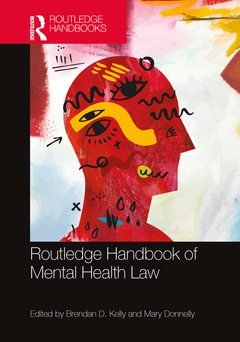Routledge Handbook of Mental Health Law Routledge Handbooks in Law Series
Coordonnateurs : Kelly Brendan D., Donnelly Mary

Mental health law is a rapidly evolving area of practice and research, with growing global dimensions. This work reflects the increasing importance of this field, critically discussing key issues of controversy and debate, and providing up-to-date analysis of cutting-edge developments in Africa, Asia, Europe, the Americas, and Australia.
This is a timely moment for this book to appear. The United Nations? Convention on the Rights of Persons with Disabilities (2006) sought to transform the landscape in which mental health law is developed and implemented. This Convention, along with other developments, has, to varying degrees, informed sweeping legislative reforms in many countries around the world. These and other developments are discussed here. Contributors come from a wide range of countries and a variety of academic backgrounds including ethics, law, philosophy, psychiatry, and psychology. Some contributions are also informed by lived experience, whether in person or as family members. The result is a rich, polyphonic, and sometimes discordant account of what mental health law is and what it might be.
The Handbook is aimed at mental health scholars and practitioners as well as students of law, human rights, disability studies, and psychiatry, and campaigners and law- and policy-makers.
Introduction; Part 1: Background and Context; 1. History and Development of Mental Health Law; 2. Independent Mental Health Monitoring: Evaluating the Care Quality Commission in England’s Approach to Regulation, Rights and Risks; The Relationship between Ethics and Law in Mental Healthcare; Part 2: European and International Standards; 4. The European Court’s Incremental Approach to the Protection of Liberty, Dignity and Autonomy; 5. The United Nations Convention on the Rights of Persons with Disabilities and Mental Health Law: Requirements and Responses; 6. Responses to the World Health Organization’s QualityRights Initiative; Part 3: Specific Groups; 7. Children’s Mental Health Care: Decision-Making and Human Rights; 8. People with Learning Disability: Scotland and Beyond; 9. Mental Health Laws and Older Adults; 10. Abuse, Neglect and Adult Safeguarding in the Context of Mental Health and Disability; 11. The Use of Trans-Related Diagnoses in Healthcare and Legal Gender Recognition: From Disease- to Identity-Based Models; 12. Personality Disorder in Mental Health and Criminal Law; Part 4: Forensic Psychiatry and Criminal Law; 13. Mental illness and Criminal Law: Irreconcilable Bedfellows?; 14. The Principles of Forensic Psychology and Criminal Law – An American Perspective; 15. Mental capacity in Forensic Psychiatry; 16. Capturing Mental Health Issues in International Criminal Law and Justice: The Input of the International Criminal Court; Part 5: Issues, Controversies, Challenges; 17. Decision-making Capacity in Mental Health Law; 18. Risk of Harm and Involuntary Psychiatric Treatment; 19. Compulsory Community Treatment: Is it the Least Restrictive Alternative? 20. Socio-economic Inclusion and Mental Health Law; 21. The Right to Mental Health; 22. Mental Health, Discrimination and Employment Law; 23. Family in Mental Health Law: Responding to Relationality; 24. Consenting for Prevention: The Ethics of Ambivalent Choice in Psychiatric Genomics; Part 6: Developments in Specific Regions and Jurisdictions; 25. Change or Improvement? Mental Health Law Reform in Africa; 26. Mental Health Law and Practice in Ghana: An Examination of Act 846; 27. Regulating Mental Health Care in South Africa: Assessing the Right to Legal Capacity and the Right to the Highest Attainable Standard of Health in South African Law and Policy; 28. Untapped Potential of China’s Mental Health Law Reform; 29. Colonisation, history and the evolution of mental health legislation in India, Pakistan, Sri Lanka and Bangladesh; 30. India’s Mental Healthcare Act, 2017 – A Promise for Transformation and Radical Change; 31. An alternative to mental health law: the Mental Capacity Act (Northern Ireland) 2016; 32. Argentina, Chile, Columbia and Peru: Mental Health Law and Legal Capacity; 33. Mental Health Policies in Spanish and Portuguese Speaking South American Countries; Part 7: Future Directions; 34. Inter-disciplinary Collaboration in the Mental Health Sector: The Role of Law; 35. The Mental Health and Justice Project: reflections on strong interdisciplinarity; 36. ‘Digitising the Mental Health Act’: Are we facing the app-ification and platformisation of coercion in mental health services? 37. Mental Health Law: A Global Future? 38. The Future of Mental Health Law: Abolition or Reform? 39. The Future of Mental Health Law - The Need for Deeper Examination and Broader Scope
Brendan D. Kelly is Professor of Psychiatry at Trinity College Dublin, Ireland.
Mary Donnelly is Professor of Law at University College Cork, Ireland.
Date de parution : 10-2023
17.4x24.6 cm
Thèmes de Routledge Handbook of Mental Health Law :
Mots-clés :
Mental health law; human rights; coercion; UN Convention on Rights of the person with disabilities; Decision-making capacity; World Health Organization’s QualityRights Initiative; Children and mental health law; older adults and mental health law; gender and mental health law; forensic psychiatry and criminal law; mental health and criminal law; involuntary psychiatric treatment; Justice and mental health law



